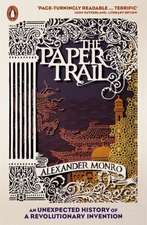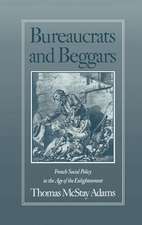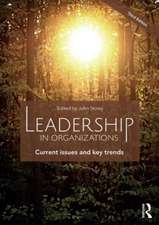A Better Way of Doing Business?: Lessons from The John Lewis Partnership
Autor Graeme Salaman, John Storeyen Limba Engleză Hardback – 4 aug 2016
Preț: 335.22 lei
Nou
Puncte Express: 503
Preț estimativ în valută:
64.14€ • 67.15$ • 53.08£
64.14€ • 67.15$ • 53.08£
Carte tipărită la comandă
Livrare economică 25-31 martie
Preluare comenzi: 021 569.72.76
Specificații
ISBN-13: 9780198782827
ISBN-10: 0198782829
Pagini: 250
Dimensiuni: 158 x 241 x 18 mm
Greutate: 0.51 kg
Editura: OUP OXFORD
Colecția OUP Oxford
Locul publicării:Oxford, United Kingdom
ISBN-10: 0198782829
Pagini: 250
Dimensiuni: 158 x 241 x 18 mm
Greutate: 0.51 kg
Editura: OUP OXFORD
Colecția OUP Oxford
Locul publicării:Oxford, United Kingdom
Recenzii
A highly readable, timely and though-provoking conribution to scholarship and practice in the fields of leadership, people management and corporate governance.
John Lewis is repeatedly upheld as a model of how good businesses should be run. In this fascinating and exceptionally insightful analysis, Graeme Salaman and John Storey dispel the myths and reveal the truths of what lies behind the success of this remarkable British institution.
Salaman and Storey, by offering an intensive case study of the John Lewis Partnership (JLP), offer guidance and hope for todays modern organization. Their deep insights from JLP will enable thoughtful leaders to be both compassionate and competitive and to create a sustainable organization.
A rare study combining depth and breadth. The authors have a thorough knowledge of the Partnership, both academic and practical, over many years; and they are able to view it in the context of criticisms of capitalist ownership and the experiences of other cooperative businesses across the industrial world. The research is nuanced, careful, balanced, genuinely inquiring. The conclusions greatly advance the understanding of both the strengths and challenges of cooperative governance.
With the John Lewis Partnership being one of Britains truly flagship enterprises, it is amazing that they have not been duly scrutinized. This has just changed, as this most informative and penetrating work by Graeme Salaman and John Storey strongly highlights how we could all learn from the John Lewis Partnership. Perhaps if this book had been available earlier, we may, as a nation, not find ourselves with such debt.
The modern corporation faces unprecedented challenges. If left unaddressed they threaten its own existence and wider social wellbeing. Rising to this challenge, Graeme Salaman and John Storey undertake a systematic scrutiny of the prime example of an alternative, stakeholder, perspective - the John Lewis Partnership. They do not advocate a simple replication of this model, rather, their analysis reveals the rich insights that are required in order to build an alternative workable response.
For the first time, the workings of the John Lewis Partnership are instructively examined by academics who have had high level and sustained access to the organisation. This book is a "must read' for anyone wishing to understand what lies behind the "partnership model" of corporate governance and the lessons that it may offer to business and society.
A penetrating discussion of a business that is so admired yet so little understood. The authors show what a delicate and complex organisation it is, where management have to balance commercial pressures against the happiness of the staff who own it. Throughout, the book also helpfully tries to draw conclusions about how far the John Lewis model can be replicated or used to influence how business works more generally.
This book is based on a longitudinal study of the John Lewis Partnership (JLP), a major UK retailer operating eponymous department stores and an upmarket supermarket chain (Waitrose). It comes from two of that country's foremost strategy and human resource management academics, Graeme Salaman and John Storey. The book is a highly readable, timely and thought-provoking contribution to scholarship and practice in the fields of leadership, people management and corporate governance.Overall, this book offers some deep and fresh perspectives on strategy, corporate governance and people management and is highly recommended to scholars, students and practitioners alike.
John Lewis is repeatedly upheld as a model of how good businesses should be run. In this fascinating and exceptionally insightful analysis, Graeme Salaman and John Storey dispel the myths and reveal the truths of what lies behind the success of this remarkable British institution.
Salaman and Storey, by offering an intensive case study of the John Lewis Partnership (JLP), offer guidance and hope for todays modern organization. Their deep insights from JLP will enable thoughtful leaders to be both compassionate and competitive and to create a sustainable organization.
A rare study combining depth and breadth. The authors have a thorough knowledge of the Partnership, both academic and practical, over many years; and they are able to view it in the context of criticisms of capitalist ownership and the experiences of other cooperative businesses across the industrial world. The research is nuanced, careful, balanced, genuinely inquiring. The conclusions greatly advance the understanding of both the strengths and challenges of cooperative governance.
With the John Lewis Partnership being one of Britains truly flagship enterprises, it is amazing that they have not been duly scrutinized. This has just changed, as this most informative and penetrating work by Graeme Salaman and John Storey strongly highlights how we could all learn from the John Lewis Partnership. Perhaps if this book had been available earlier, we may, as a nation, not find ourselves with such debt.
The modern corporation faces unprecedented challenges. If left unaddressed they threaten its own existence and wider social wellbeing. Rising to this challenge, Graeme Salaman and John Storey undertake a systematic scrutiny of the prime example of an alternative, stakeholder, perspective - the John Lewis Partnership. They do not advocate a simple replication of this model, rather, their analysis reveals the rich insights that are required in order to build an alternative workable response.
For the first time, the workings of the John Lewis Partnership are instructively examined by academics who have had high level and sustained access to the organisation. This book is a "must read' for anyone wishing to understand what lies behind the "partnership model" of corporate governance and the lessons that it may offer to business and society.
A penetrating discussion of a business that is so admired yet so little understood. The authors show what a delicate and complex organisation it is, where management have to balance commercial pressures against the happiness of the staff who own it. Throughout, the book also helpfully tries to draw conclusions about how far the John Lewis model can be replicated or used to influence how business works more generally.
This book is based on a longitudinal study of the John Lewis Partnership (JLP), a major UK retailer operating eponymous department stores and an upmarket supermarket chain (Waitrose). It comes from two of that country's foremost strategy and human resource management academics, Graeme Salaman and John Storey. The book is a highly readable, timely and thought-provoking contribution to scholarship and practice in the fields of leadership, people management and corporate governance.Overall, this book offers some deep and fresh perspectives on strategy, corporate governance and people management and is highly recommended to scholars, students and practitioners alike.
Notă biografică
Graeme Salaman in Emeritus Professor of Organisation Studies at The Open University. His areas of teaching, writing researching and consulting are: the management of innovation, the management of change, management competences, strategic human resource management, performance management, knowledge management, innovation and leadership. He is an active consultant, speaker and trainer and has written over sixty books and articles including Managerial Dilemmas: Exploiting Paradox for Strategic Leadership (with John Storey), Wiley, 2009; Managers of Innovation: Insights into Making Innovation Happen, (with John Storey) Blackwell, 2004; Strategy and Capability, Blackwell, 2003John Storey is Professor of Management at The Open University, UK. He has authored more than 100 books and refereed articles. These range across human resource management, organisational analysis, leadership, innovation and supply chain management. He is a Fellow of the British Academy of Management. He was formerly professor and head of research at the University of Loughborough and before that was Principal Research Fellow at the University of Warwick Business School. He was Chairman of the Involvement & Participation Association (IPA) from 2008 to 2013 and a member of the government advisory panel on leadership and management.















